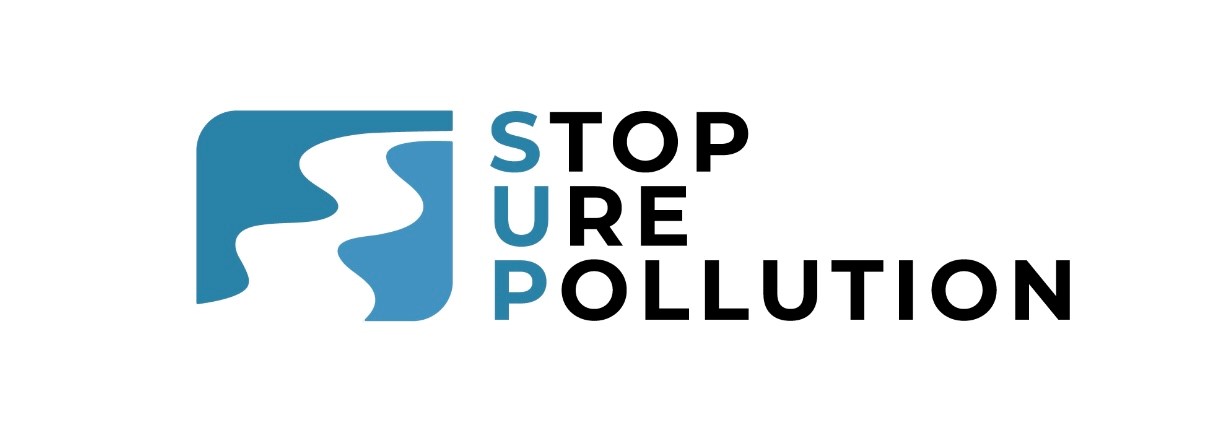After heavy rain in early February Richard Loutoka commented that this had diluted the endotoxins. Here are the Bactiquick test results at Aysgarth Falls and Ulshaw Bridge (near Middleham) in December 2025 and February 2026: And those for February 16. which show that such dilution had stopped.
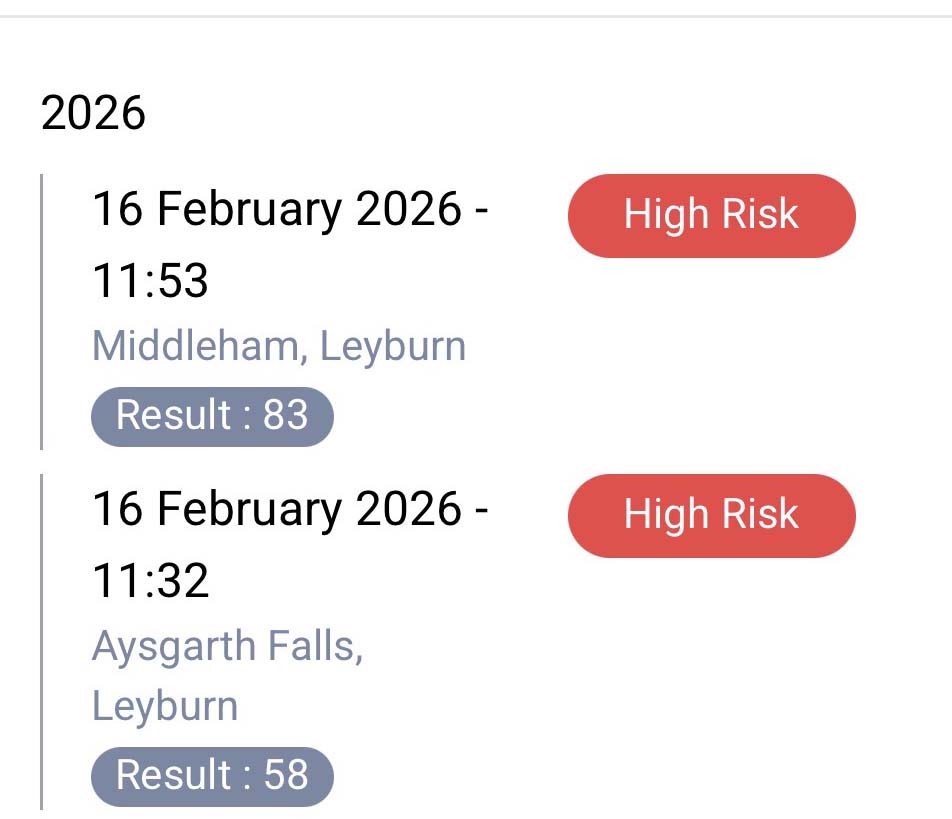
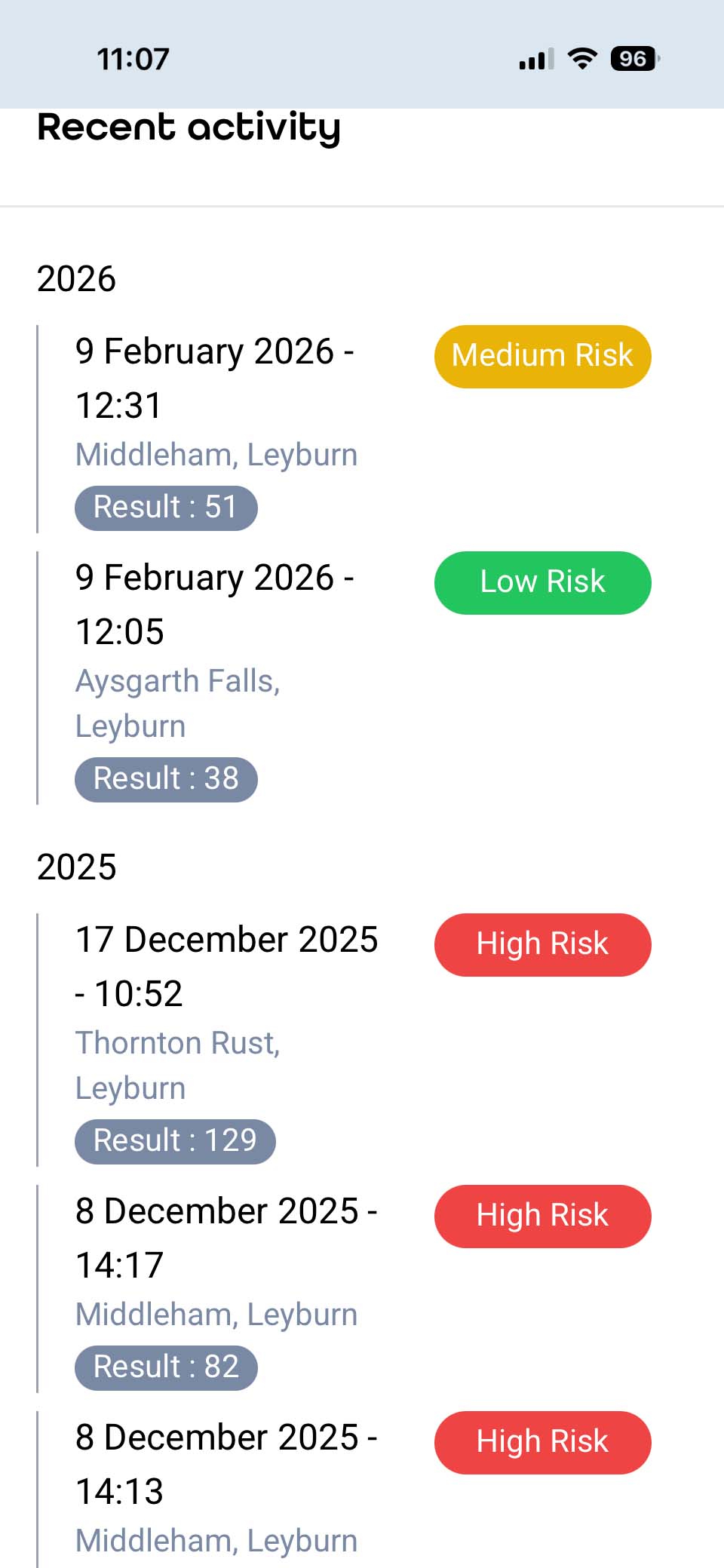
Surfers Againist Sewage have called for action against what it sees as deeply flawed proposals outlined in a White Paer by the government regarding water companies and the pollution of our seas and rivers.
On January 20 the government released the White Paper about what it described as 'the biggest overhaul of the water system in a generation'. Scroll down to after the Surfers Against Sewage response to read the full press release.
It has been called a whitewash by Surfers Against Sewage and a disgrace by Prof Becky Malby of the Ilkley Clean River group. Click here for the very detailed response by the latter. ]

Stop Ure Pollution (SUP) is celebrating being awarded almost £20,000 by The National Lottery Community Fund which will enable it to carry out more detailed and extensive testing of the River Ure and its tributaries.
The National Lottery Community Fund seeks to support local action to improve and protect the environment which is in accord with SUP’s aims to work with citizen scientist volunteers to protect the River Ure and its tributaries for recreation and wildlife. Water testing by volunteers has already highlighted the impact of pollution from sewage and run-off from farms along the river.
Since its inception in June 2024 one of SUP’s key objectives has been to purchase the Fluidion system of monitoring E.coli that was successfully used to protect swimmers taking part in events in the River Seine during the 2024 Paris Olympics.
The National Lottery Community Fund award will enable SUP not only to purchase a Fluidion Alert 1 monitor and reagents, but also Petrifilm test kits.
Petrifilm, with its sample-ready, streamlined standardized and simplified process of microbial quantitative indicator testing, is used extensively for the enumeration of E.coli and coliforms in the food and beverage industries.
SUP can also now buy riverside warning signs to be displayed at popular bathing sites such as Aysgarth Falls. This summer weekly testing at Aysgarth Falls and Ulshaw Bridge using the Bactiquick hand-held kit showed that the river water was not safe to bathe in.
Prof Richard Loutoka, chairman of SUP, did most of the testing. He said: ‘We wanted a Fluidion machine because it provides a quantified response in terms of E. coli/100 ml present in the sampled water, that has been validated through numerous side-by-side studies with approved laboratories and international organizations including the WHO and UNICEF. By using Fluidion water quality monitoring is considerably simplified whilst reducing costs and also a shortened time between sampling and getting a result. It should give us E.coli levels in between two and 10 hours.
‘We are very grateful to The National Lottery Community Fund because we can not only purchase such equipment but also the necessary reagents.’
The testing carried out this summer with Bactiquick showed just how expensive the reagents are. SUP is also very grateful for local donations which have enabled it to buy these this year.
Last month Jervaulx Fly Fishers Club donated £1,000 to SUP and £146.43p was raised at a coffee morning at Thornton Rust Village Institute. This enabled SUP to purchase an additional Bactiquick monitor and reagents.
About 75 per cent of the £19,992 awarded by The National Lottery Community Fund to SUP will be spent on reagents for testing with Fluidion, Bactiquick and Petrifilm. SUP will also purchase a DJI Flip Drone for reporting any pollution events to the Environment Agency.
The National Lottery Community distributes money raised by National Lottery players for good causes and is the largest community funder in the UK. It aims to distribute at least £4 billion of National Lottery funding by 2030.
As part of this, the funder has four key missions, which are: to support communities to come together; be environmentally sustainable; help children and young people thrive and enable people to live healthier lives.
National Lottery players raise over £30 million a week for good causes across the UK. Thanks to them, during the year 2023/24 The National Lottery Community Fund awarded over half a billion pounds (£686.3 million) of life-changing funding to communities across the UK, supporting over 13,700 projects.
To find out more visit www.TNLCommunityFund.org.uk
Thanks to the donations Stop Ure Pollution it has been possible to continue testing river water at Aysgarth Falls and Ulshaw Bridge using Bactiquick (click on each to see the spreadsheets of results).
Prof Richard Loutoka (chairman of SUP) commented that the endotoxin levels at Aysgarth Falls were in the high risk range whether at high or low river levels which was concerning.
He said:’ The Ulshaw Bridge results (very elevated fields highlighted in red, elevated levels in amber) show the week to week variability in one site and confirms that a single good result may be misleading. Hence the need for regular testing allowing a 90th or 95th centile figure to be calculated.’
The need for more testing was emphasised at SUP’s first AGM on September 23rd 2025. Charlotte Simons of the Yorkshire Dales River Trust presented the final report of the testing carried out by SUP volunteers on two days during 2024.
She said: ‘We have established a baseline water quality profile but it is still considered a snapshot. We need to do a lot more [testing] to get more standardisation.’ She added the levels of E-coli showed that there were concerns about people bathing at Aysgarth Falls.
She would like to see testing carried out which would identify if the bacteria was from human or animal sources. But the YDRT doesn’t have the funds at present for more detailed testing.
Richard told the 90-strong audience that SUP had been able to purchase a Bactiquick testing machine and the reagents required. The latter cost £150 for five. But it would like to purchase a Fluidion machine which was even more effective - but much more expensive.
It would be even better, he said, if the Environment Agency was regularly testing for E-coli but that would require a site such as Aysgarth Falls having designated bathing water status. The rules for this were based on sea bathing, hence the requirement of proving that 100 people on two different days bathed at a site. And bathing didn’t include other water users such as those paddling, paddle-boarding, or fishing.
‘I think it is highly unlikely we will get it unless they change the rule from bathers to water users,’ he said.
Instead, with SUP funds, he has been using Bactiquick to carry out weekly tests at Aysgarth Falls and Ulshaw Bridge. As the results, especially at Aysgarth Falls, have constantly shown high risk levels since he started in July, he told the meeting that the alternative was to have citizens’ designated recreational water status so warning signs could be displayed. But such signs would cost £300 to £500.
He encouraged people to continue reporting pollution events to the Environmental Agency (EA). When they did so they should state where the incident was, take photos and make sure they were given a reference number. He added that any dead fish should not be removed from the water but left for the EA to see. He asked them to then inform SUP so it could follow up on the issue.
Richard also encouraged people to check the storm overflow map on the Yorkshire Water website. ‘We all need to work together,’ he said.
Details of the 2025 to 2030 Yorkshire Water plan were outlined by Steve Jackson, Strategy Manager for YW, who commented: ‘This is our biggest environmental programme.’ One objective is, he said, to reduce storm overflows by laying new pipes to separate rain water from sewerage. His colleague, George Taplin, added that YW was aiming to install a predictive warning so that problems could be spotted before there was an impact upon the environment.
Stop Ure Pollution is very grateful to the Yorkshire Dales Salmon Group which has made a donation of £1,940. This is sadly because the salmon group has been wound up.
SUP has also received a donation of £120 from Thornborough Masonic Lodge towards purchasing testing equipment.
We are very grateful for such donations as they have made it possible to continue using Bactiquick to regularly test the water of the River Ure. We continue to aim to have enough to purchase the Fluidion testing equipment.
The most recent test results are as follows:
Appersett 1/9/25 Red High Risk 76 ERU
Aysgarth Falls 12/9/25 Red, High Risk 132 ERU
1/9/25 Red, High Risk 141 ERU
29/8/25 Red, High Risk 147 ERU
22/8/25 Red, High Risk 137 ERU
Ulshaw Bridge, 15/9/25 Red, High Risk 119 ERU
1/9/25 Red, High Risk 115 ERU
At its first AGM Stop Ure Pollution will report that it is planning to put up posters warning about the danger of swimming in the River Ure due to pollution. The AGM is at 7pm on Tuesday September 23 in Leyburn Methodist Church Hall.
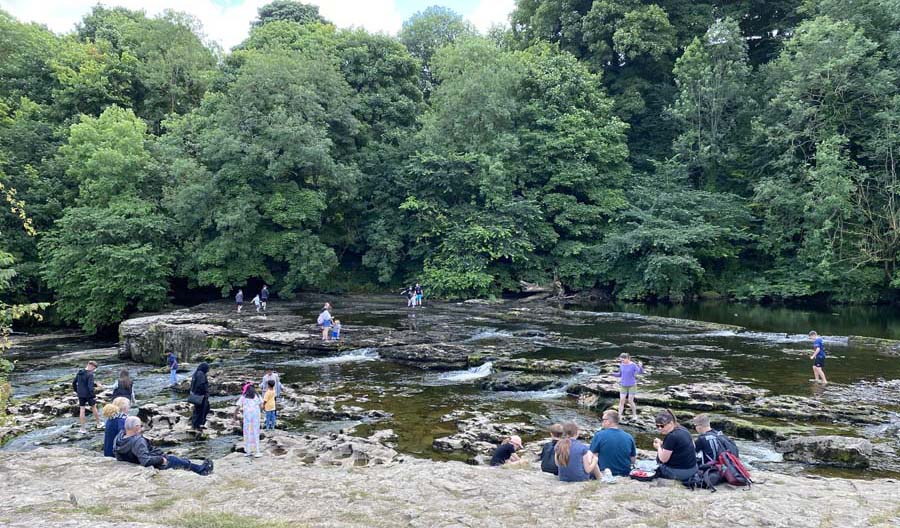
Stop Ure Pollution has issued a red alert for dangerous levels of E.coli and endotoxins in the River Ure in mid Wensleydale. This article is being updated when we hear of more people becoming ill due to contact with the water of the River Ure.
Photo by Pip Pointon: people bathing at Aysgarth Falls
In the past two weeks Stop Ure Pollution has been informed that eight people have fallen ill after contact with water in the River Ure and two were taken to hospital. Four of the incidents occurred at Aysgarth Falls.
That is not surprising given the results that the group’s chairman, Prof Richard Loukota has had using the nationally-recognised hand-held testing kit called Bactiquick on which there is a red light and a numerical value if there are high levels of endotoxins and, therefore, E.coli. Every time it has done just that and so shown that humans and dogs cannot enjoy the River Ure safely.
The tests at Aysgarth Falls, which is a very popular tourist attraction, were carried out on July 20 and 27 and on August 2. He has had similar results when carrying out weekly tests at Ulshaw Bridge.
Bactiquick detects a wide range of bacterial endotoxins including E.coli, Salmonella, Legionella and Vibrio and gives results in 15 minutes. Prof Loukota has then sent water samples to a registered lab and to Save Our Swale in Richmond for further E.coli testing.
He reported that the results of 10 consecutive E.coli cultures give 90th Centile reading of 2169 E.coli Colony Forming Units (CFU). As a guide: Excellent = 95th centile <500 CFU, Good =95th centile of <1000, Sufficient = 90th centile <900, Poor = numbers worse than these i.e. higher numbers of CFUs.
Bactiquick results are ‘high risk’ at levels above 58 ERU (endotoxin risk units), and the results from the Ure have been between 146 and 166.
Prof Loukota said: ‘This situation is very concerning and all water users should be aware of the risks, take the appropriate hand hygiene steps and should avoid ingesting river water particularly after rainy weather, when Combined Sewage Outlets are most likely to discharge and animal faecal matter is more likely to be washed into the river.’
Surfers Against Sewage, which funded the Bactiquick monitor, commented: ‘Stop Ure Pollution's dedicated citizen science shows their swim spot on the River Ure would be rated “Poor” by the regulator. And with swimmers falling ill from the river, it’s clear the monitoring system is failing water users – dangerously so. Under current regulations, only a handful of our rivers, lakes, and other inland waters have consistent, official testing for the impact of water quality on human health. Any dipper, paddler or swimmer diving in should be able to easily assess the risk, without community groups having to fill the data gap. No one should be left guessing whether their favourite swim spot will make them sick.’
Prof Loukota has carried out ten tests at Ulshaw Bridge as part of the Protecting Wild Waters project in conjunction with Surfers Against Sewage.
When there was little water in the River Ure and its tributaries in May several people took photos of the river bed. We sent those photos to the Yorkshire Dales River Trust and it was not surprising to be told that all showed an abundance of algae. See below.
Charlotte Simons consulted others at YDRT and informed us: 'Most of the photos are showing algae growing in the river - probably due to proximity to a pollution source - such as a water treatment works, agricultural source or something like a septic tank.'
Duelly Beck
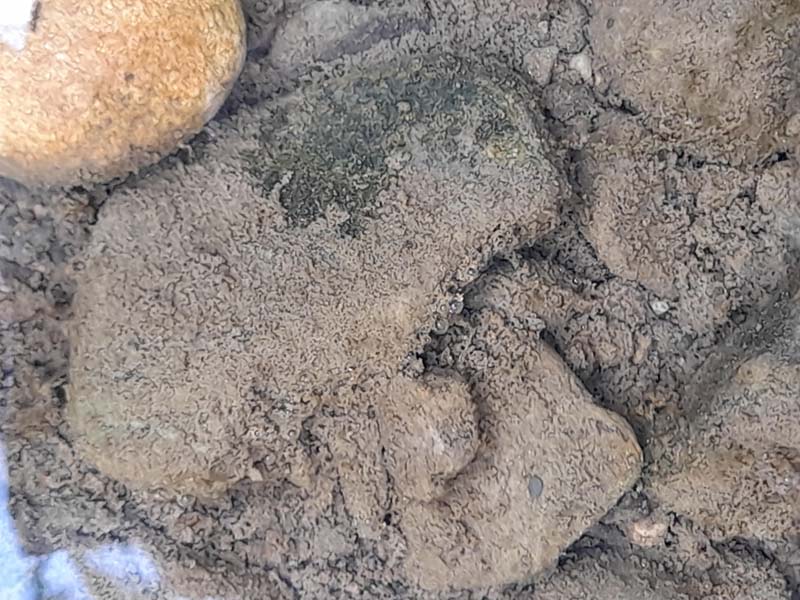
Mid Bishopdale
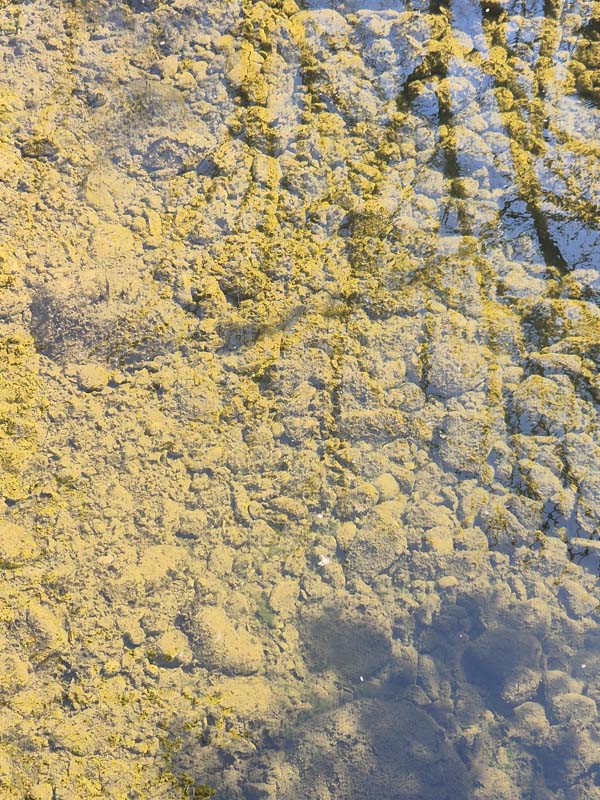
By Wensley Bridge
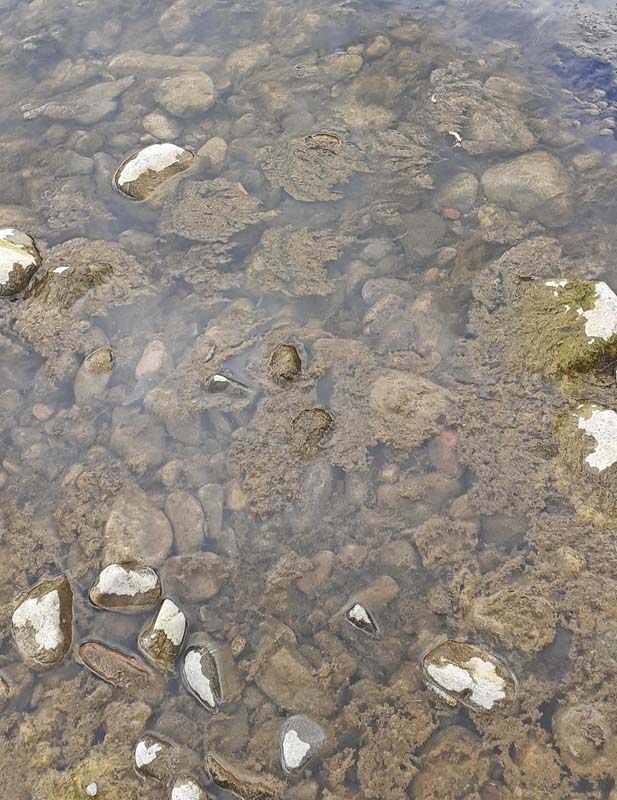
Below Leyburn
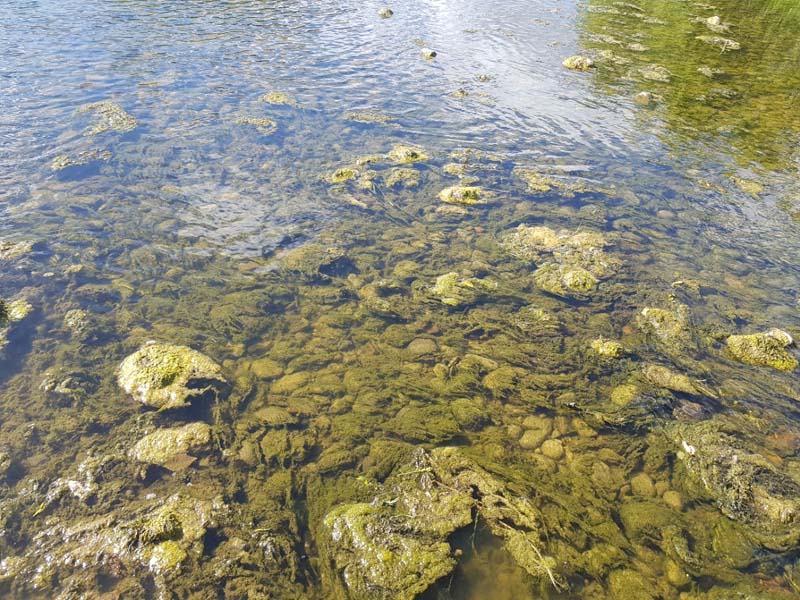
Below Harmby sewerage works
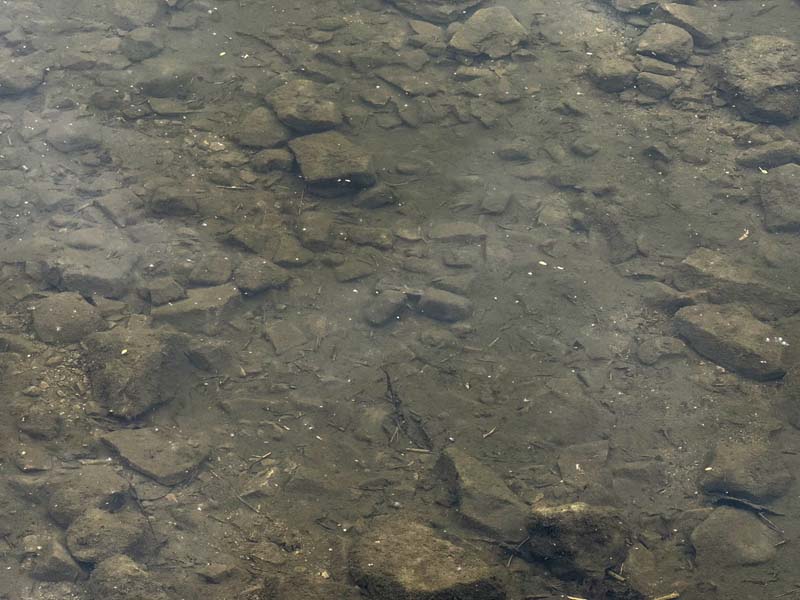
At Ulshaw Bridge
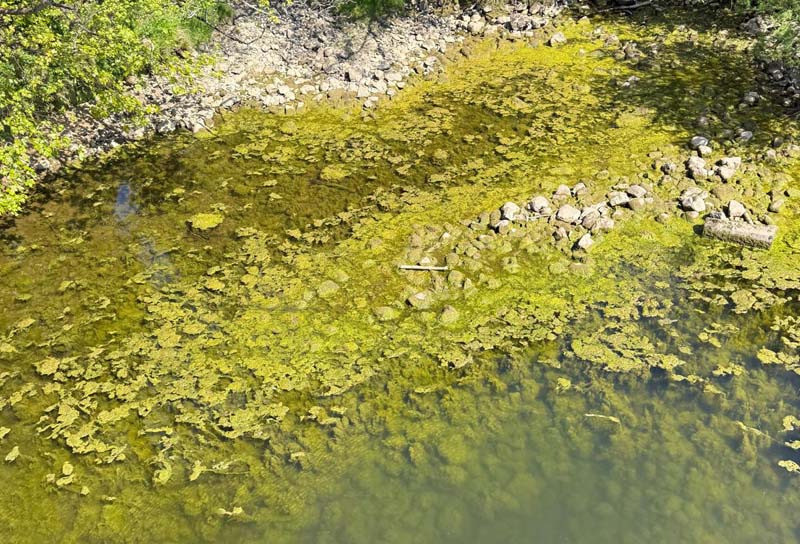
River Cover at Carlton
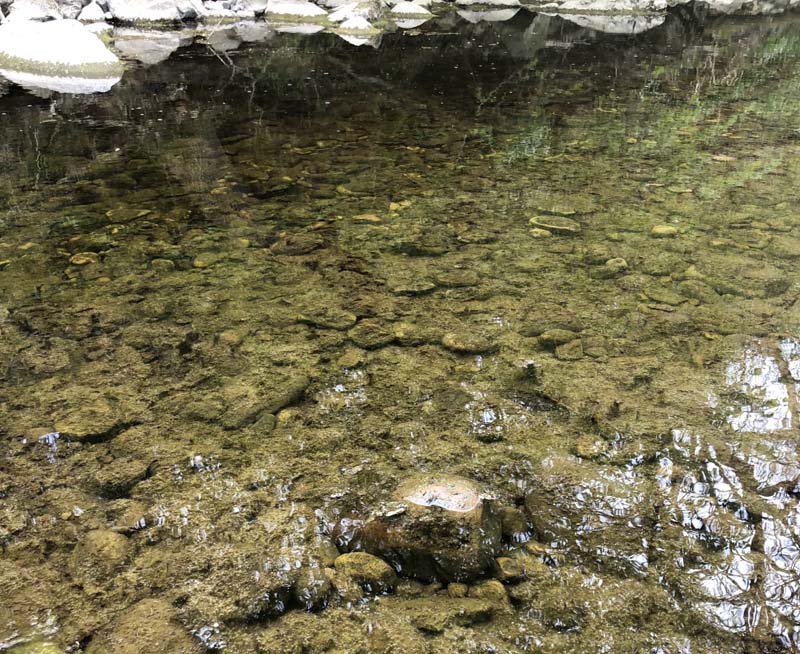
Algae on feather moss at Kilgram
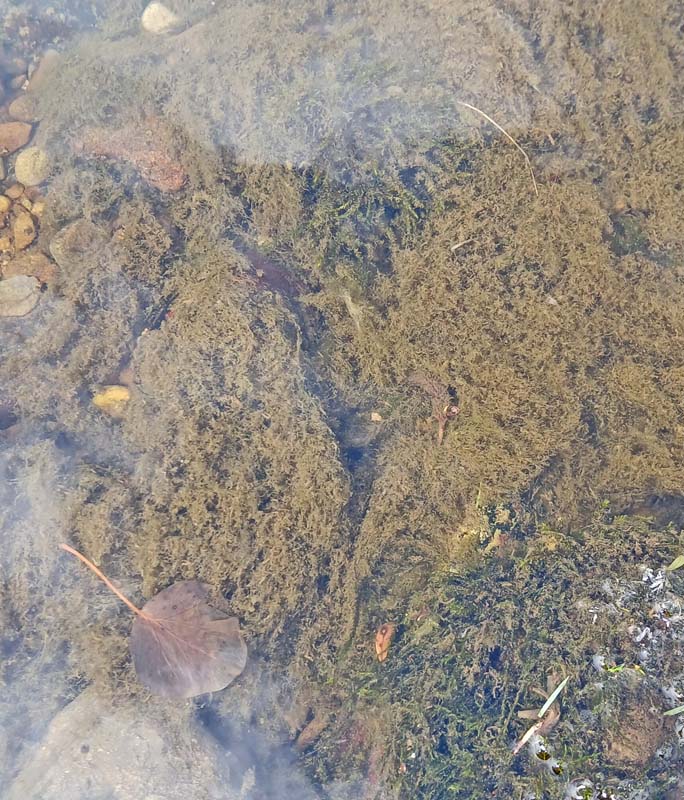
Algae on river bed at Kilgram
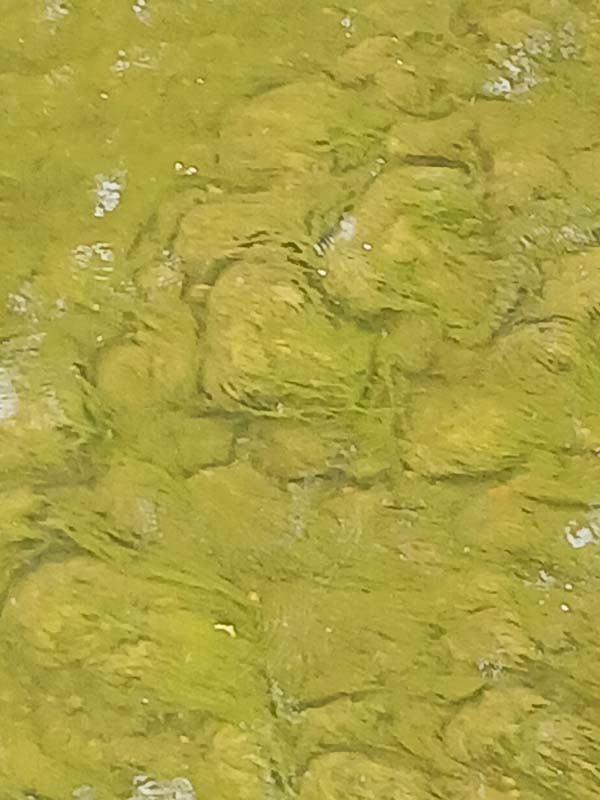
The Sewage Campaign Network is urging everyone to write to their MP to call for a stop to the water bills being increased.
In its fact sheet it states: ' All our rivers are polluted, and all our chalk streams are in poor health. Untreated sewage was dumped in our waterways 464,056 times for over 3.5 million hours in 2023, which is 1,271 discharges a day – that’s the equivalent of sewage flowing nonstop for 450 years.
'Water Bill Rises: Ofwat has decided that our water bills are to go up by an average of £123 this year from April (the range is £79 to £224 depending on where you live), to bail out the failing water companies that pollute our rivers, lakes and seas for profit. But that’s not the end of it, prices will continue to rise for the rest of this decade by 36%, sending good money after bad, and we have no choice. Six water companies are challenging the bill rises - they want more!
'Criminal Investigations and Poor Performance: Ofwat along with the Environment Agency, is investigating every water company in England for illegal pollution after Windrush Against Sewage Pollution (WASP) did the regulator’s job, uncovering 9,000 illegal sewage discharges using water industry data Every water company is underperforming and harming our environment, yet we are still asked to pay more. Ofwat, whilst putting up bills has also proposed fines of £168m for Thames Water, Yorkshire Water and Northumberland Water for failing to manage wastewater treatment works and networks and harming the environment.'
There is much more before the conclusion: ' Water companies have polluted our rivers lakes and seas, destroying the environment, threatening people’s health and attacking local businesses that depend on our waters. They have racked up astonishing debt, raked in billions in debt payments, depleted our assets and left our sewage system in decline. They are operating outside the law, failing to deliver on their obligations, perform worse than most water systems in the world, and yet we are being expected to pay more with no end in sight. The ‘vision’ presented here is the dying gasp of a totally broken water system, that services international financiers over customers. This must stop. Make your voice heard. Join the 2,500 people who have already written to their MP demanding that the government stops bill rises now https://campaigns.sewagecampaignnetwork.org.uk/.'
Earthwatch Europe
The Great UK Waterblitz - All catchments
April 25th - 28th
The Great UK WaterBlitz is a biannual campaign calling on everyone to go out and test the quality of their local freshwater including rivers, streams and lakes. This helps to build a national picture of water quality across the UK.
You can now sign up to take part in The Great UK Waterblitz, which this year takes place between April 25th and 28th. There are only a limited number of kits available so if you would like to get involved it's important to sign up early. More information and details for how to sign up are available here

When teams of citizen scientists tested the waters of the River Ure in October it was found that the level of E.coli concentration at Aysgarth Falls was eight times higher than what is officially considered to be safe for bathing. Above: The Upper Falls at Aysgarth during August 2024
Prof Richard Loutoka, chairman of Stop Ure Pollution with which most of the volunteers were associated, commented: ‘It is a very disappointing result for the state of the river and worrying to think of all the people who use the river for various pastimes.’
In January 2025 SUP raised the alert when it was reported that raw sewage had been discharged into the Ure below Leyburn for 62 hours. Click on Three-Day Sewage Spill for the BBC story.
Read more: High levels of E.coli found in the River Ure in October 2024
The river water at Aysgarth Falls did not meet the minimum standard for safe bathing on August 21st when it was tested by Stop Ure Pollution (SUP) citizen science volunteers.
At a public meeting organised by SUP at Leyburn Methodist Church Hall on October 1st Charlotte Simons of the Yorkshire Dales River Trust (YDRT) reported that 20 out of the 45 sites tested along the river and on some tributaries on August 21st had E-coli concentrations above the levels deemed sufficient (minimum standard for safe bathing).
She said that the E-coli levels that day had risen above that level from Bainbridge until past Spennithorne, with increased levels also at Masham Bridge and Ripon North, with the peak being at Lord’s Bridge near Wensley.
‘None of the results are incredibly high compared to findings on the Wharfe and the Nidd under similar conditions though probably a bit surprising for low flow conditions. The days preceding the sampling had been mostly dry with only light rain in places so the levels of E-coli were not influenced by agricultural runoff or Combined Sewer Overflows due to wet weather.’
She was particularly concerned about the situation at Aysgarth Falls because, due to it being so popular, it could be considered for designated bathing status.
She praised all the volunteers, many of whom were at the meeting, for their efforts. ‘It was a brilliant turnout.’
The chairman of SUP, Prof Richard Loukota, pointed out that the group had only been formed in July and yet 41 of its volunteers had taken part in the testing of the river water on August 21st from Lunds to where the Ure joins the Ouse near Boroughbridge.
Mrs Simons said that the testing had taken place that morning with all the samples from the SUP teams delivered to her at Masham by 2.30pm. The tests also included those for phosphates, ammonia, nitrites, temperature and conductivity and Mrs Simons told the meeting that overall the results reflected a good quality river although further testing was required on the Skell and Tutt tributaries. All these results were on show at exhibitions at the Quaker Meeting Houses in Leyburn October 3rd to 5th.
Due to the E-coli results Mrs Simons stated that there would need to be another testing when the river water was low due to the high levels of E.coli between Bainbridge and Spennithorne. Checks would also have to be made below the water treatment plant at Redmire.
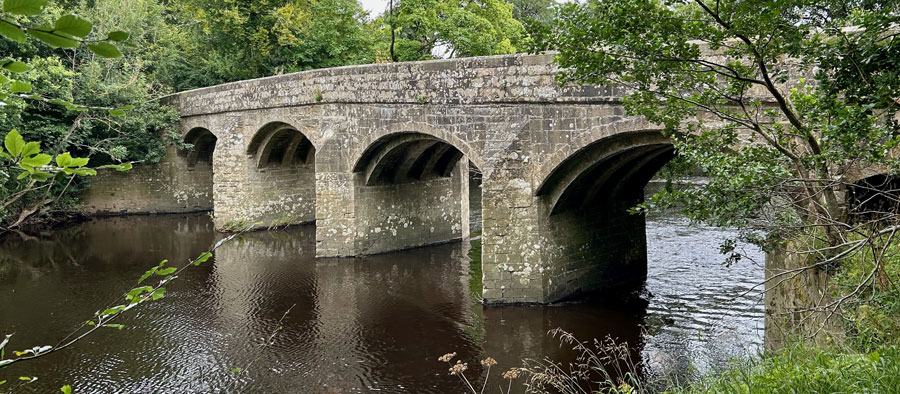
The water along the length of the River Ure was sampled at 45 sites on August 21st 2024, from the top of Wensleydale to beyond Boroughbridge, by 41 volunteers working with the Yorkshire Dales River Trust (YDRT) and Stop Ure Pollution. This sampling was done to get a picture of the quality of the river and to identify sources of diffuse and point pollution.
The chairman of SUP, Prof Richard Loukota, commented: ‘It was great to see that SUP volunteers made up almost 88% of the citizen scientists sampling the Ure. This confirmed how concerned our residents are about the state of the river and are prepared to do something about it. I’m sure the results will be illuminating and point our way forward.’
And Charlotte Simons, YDRT’s Catchment Partnership Senior Project Manager said: ‘This scale of testing has only been made possible due to the support of the volunteers. Their support at two local meetings in Leyburn the first on April 30 about the health the River Ure, sponsored by the Association of Rural Communities, and the second on June 25 when Stop Ure Pollution (SUP) was launched, has led directly to this sampling being possible, the results of which will be used to identify key issues and areas where work is needed to improve the quality of the river.’
Thirty six SUP volunteers were trained on taking water samples at a session at Lords Bridge on the Bolton Estate on August 14 with Simons and Mary Boyd from the YDRT. They formed the core of samplers on the 21st, making up 10 teams of volunteers, sampling from the top of the Ure at Lunds all the way downstream to at Aldborough, which is south of Boroughbridge, close to the confluence of the Ure and the Swale.
When thanking the water samplers afterwards Boyd said: ‘All the kits and samples arrived safely and the samples [for faecal bacterial levels] reached the lab by 5pm [on August 21]. The lab has confirmed that there were no issues with any of the samples received. ‘
The samples were sent to ALS independent accredited laboratories at Wakefield and Coventry with the cost of the testing being met by Yorkshire Water.
There will be another sampling day when the river water is high. Boyd explained: ‘The purpose of the testing is to get snapshot of the health of the River Ure by measuring a series of elements. Sampling at multiple sites along the Ure and its tributaries will enable us to understand the chemical and biological profile of the river, and to help us gauge the relative importance of different pollution sources – under the same weather and river conditions.
‘The samples taken will be tested for nitrates, phosphates, faecal bacterial levels, suspended solids, pH and total organic carbon. Measurements will be taken at each sample point for water temperature, conductivity and turbidity. This snapshot will show the relative health of the river along with identifying areas of diffuse and point source pollution.’
There was a second sampling day, when the water levels were high, in October 2024. See Test Results
Above: Kilgram Bridge - believed to be of 12th-Century foundation, with a Roman river crossing beneath. Photo and caption by Pamela Knights
Stop Ure Pollution (SUP) was unanimously voted into existence at a meeting at Leyburn Methodist Church Hall on June 25 2024. Over 70 attended the meeting as they were so concerned about the pollution of the River Ure, including that caused by the discharge of raw sewage.
The chair of the interim committee of the ‘Health of the River Ure’ group, Prof Richard Loukota, said the aims of SUP were: to stop the discharges of raw sewage when storm conditions were not occurring; to upgrade water treatment facilities; and to identify pollution caused by the run-off from farms.
One man asked how they could bring about change when agencies such as Defra and the Environment Agency were so under-funded and under-manned. ‘You can collect as much data as you like but when you look at Defra they don’t have the resources because of the cutbacks.’ He also wondered what could be done if polluters weren’t breaking the law.
Richard replied that there were instances when polluters were breaking the law and Ofwat has the power to impose unlimited fines. ‘They need to be pushed to do so,’ he said.
Sheila Toper from Aysgarth commented: ‘We have got to start somewhere and the more voices raised the more successful we will be.’
When asked how soon data could be collected Charlotte Simons of the Yorkshire Dales River Trust (YDRT) explained how volunteer citizen scientists could assist with sampling the river water throughout its length and from that data hot spots could be identified.‘The data collected by volunteers will be more specific and there will be far more testing along the river.’
Along the Rivers Wharfe and Nidd volunteers had tested between 30 and 40 sites she said and added: ‘That gives you a far greater picture of where the pollution might be coming in.’
She explained the YDRT will now work with the SUP volunteers to identify testing sites, hold training days for volunteers and organise a date for the first sampling by the end of August.
Since the meeting about the health of the river on April 30, sponsored by the Association of Rural Communities, over 40 people have volunteered to help with water sampling.
Some at the meeting questioned the independence of the testing of the water samples as the cost of this would be met by Yorkshire Water. Charlotte confirmed that the laboratory is an independent accredited and has been used by YDRT for both testing of samples from the Wharfe and the Nidd.
Richard pointed out that testing water samples was very expensive and it will take time for the new group to build up funds. He said he had attended Save Our Swale meetings to learn from them about setting up such a group.
Both he and Charlotte emphasised that this needed to be a collaborative effort, working with not only Yorkshire Water and the Environment Agency but also the Yorkshire Dales National Park, and other river groups to be effective.
Below: Some of those who attended the open meeting organised by the Association of Rural Communities on April 30 2025 which led to the creation of Stop Ure Pollution. For a full report click here.
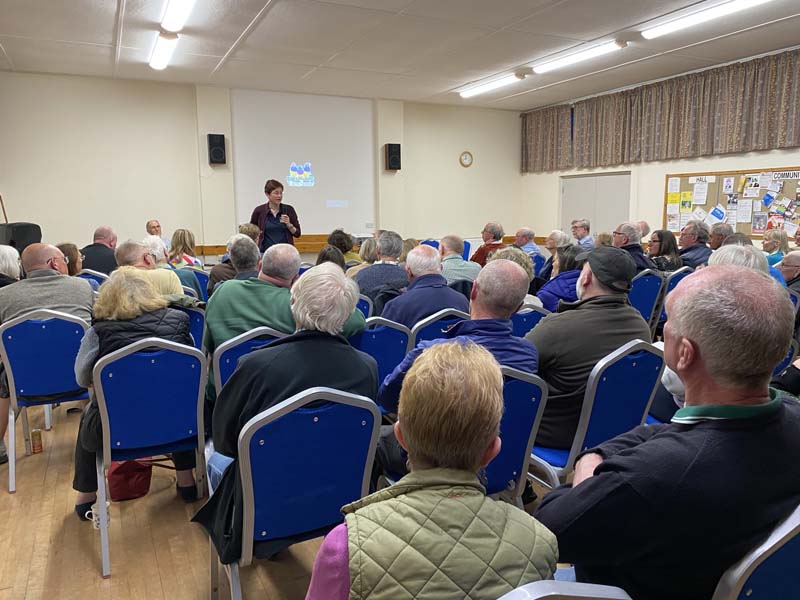
A Surfers Against Sewage (SAS) team paid a visit to Aysgarth Falls on the morning of Thursday June 20 2024 to find out about pollution in the River Ure. Below: from left: Ann McKelvey, Chloe Flood, Kirsty Davies, Katie Bone and Richard Loukota.
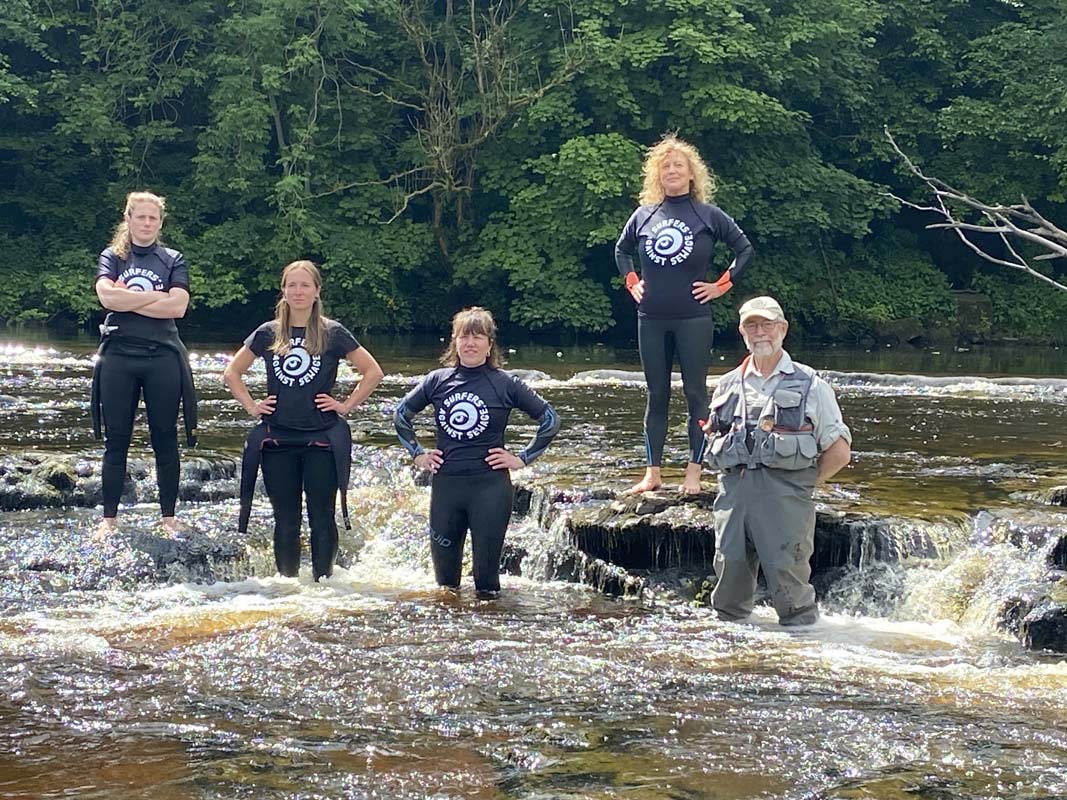
They were invited by Prof Richard Loukota, the interim chair of the group being formed to campaign against the pollution of the River Ure and its tributaries.
Surfers Against Sewage (SAS) embarked on an Election Road Tripin June 2024 travelling the length of the UK to galvanise communities to demand election candidates to end sewage pollution. It aimed to take the sewage debate to political, sewage and surfing hotspots.
It was invited by Save Our Swale (SOS) to Prime Minister Rishi Sunak’s constituency to hold one of its hustings at Richmond on Friday evening (June 21 2024). The CEO of Surfers Against Sewage, Giles Bristow, commented: ‘Local activists [in Swaledale] have been fighting to clean up their favourite beauty spot.’
In Wensleydale Aysgarth Falls is a key beauty spot but the Association of Rural Communities, which has sponsored the creation of the River Ure group, has pointed out that the Falls are affected by raw sewage discharges.
With its brightly painted open-top double-decker battle bus (see below) its team on Thursday (Ann McKelvey, Chloe Flood, Kirsty Davies and Katie Bone) were delighted to be able to visit the Upper Falls at Aysgarth where they were met by Richard and others keen to see an end to the pollution of the River Ure.
Richard said: ‘Surfers Against Sewage are very keen to have safe water for everyone and they have been incredibly supportive of Save Our Swale. They have kindly offered their support with everything you need to know when you are setting up a group. ‘
He added that many of the visitors at the Falls that day did not realise how much the River Ure was polluted, both from sewage and also agricultural run-off.
Having a River Ure group will, he added, help them to work collaboratively not only with SOS, the Nidd Action Group and the Ilkley Clean River Group but also nationally with others such as Surfers Against Sewage. ‘We are struggling together,’ he said. And that included those who had become ill swimming in rivers.
He hoped an online database for rivers could be developed similar to the Surfers Against Sewage one for our seas and oceans. ‘I think the pollution of the rivers is becoming something people are concerned about and it is going to affect their voting,’ Richard commented.
